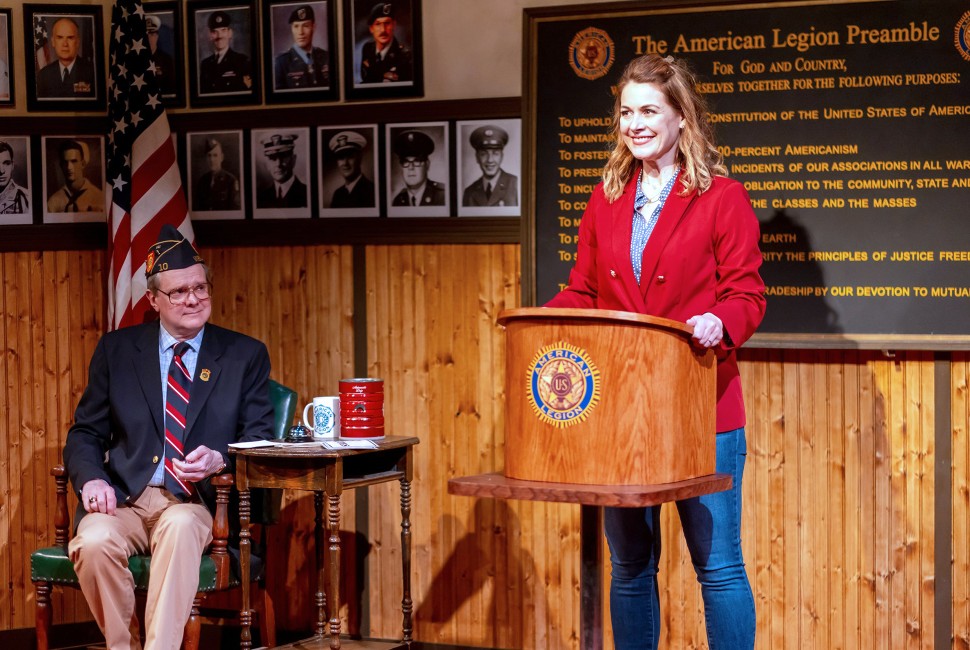When she was 15-years-old, Heidi Schreck competed for scholarships in Constitution speech contests hosted by the American Legion. Years later, as the mother of twin daughters, Schreck returned to the Constitution seeking answers to explain the history of domestic violence in her Pacific Northwest hometown.
The resulting play, “What the Constitution Means to Me,” written and performed by Schreck, premiered in New York in 2018 before transferring to Broadway for five months and subsequently touring nationally. The play earned two Tony Award nominations and was a finalist for the Pulitzer Prize. When the pandemic prematurely ended the tour, the play was filmed and broadcast on Amazon Prime.
The play is receiving its first Chicago staging at TimeLine Theatre Company. Lending their expertise to the production are Weinberg College faculty Kate Masur, a specialist in 19th-century U.S. history, and Joanna Grisinger, a legal studies specialist who regularly teaches two courses on constitutional law.
Northwestern alumni contributing to the production include Raymond Fox (’89) in the role of the Legionnaire, and Emily Marso (’12) as the play's associate director.
Northwestern Now caught up with Masur and Grisinger about their “night job” as associate dramaturgs to ask why the play resonates and why they chose to bring history to the stage.
Both of you are published history and legal scholars, why get involved in a local theater production?
Grisinger: We’re both used to explaining things, in writing and in teaching, and in some ways, this was a logical next step! It was refreshing to talk with people who were really engaged in this project from the theater perspective, and who were curious about the legal questions raised by the play. I appreciated that they came at the legal questions from a different perspective, and I found it a fun challenge to offer whatever additional help we could.
What current issue does this play effectively highlight?
Masur: The play is multifaceted, but a central theme is the relationship between the Constitution and women’s lives, especially their experiences of pregnancy and gender-based violence. It’s also about patriarchy and women’s vulnerability, and about people’s everyday lives in the shadow of law. The play also highlights the power of the Supreme Court. All of these are, of course, front-burner issues in the present.
The play looks at the ways the Constitution has protected, or failed to protect, the lives of women. Can you explain how the Constitution is interpreted in practice?
Grisinger: Constitutional rights are largely negative rights — that is, limits on what the government can do to you, rather than guarantees of things the government must do for you. Thus, the First Amendment protections of freedom of speech are couched as “Congress shall make no law…”; by the same token, there’s no affirmative right to food, or health care, or even the vote.
As the play mentions, even before Dobbs, there was no affirmative right to an abortion, just a limit on the state’s ability to bar you from getting one. Nothing about the “right” to an abortion included help for poor women who couldn't afford the costs of the procedure. Similarly, the play talks about Castle Rock v. Gonzales, where the Court held that the police had no affirmative responsibility to protect a survivor of domestic violence.
What has been the most interesting/surprising thing about collaborating with a theatrical production team?
Masur: It was amazing to witness the first read-through of the script, where the actors and production staff were all in the room together for the first time. You could see how everyone involved was working to create a collaborative, energetic experience. It’s impressive how many people are needed to put a play together, when you consider everything from lighting to ticket sales.
Where do you find hope — both in the play and the power of this foundational document of U.S. democracy?
Grisinger: As to the play, it’s wonderful to see people who aren’t trained lawyers grappling with the limits, but also the possibilities, of the U.S. Constitution and judicial protection of rights.
As someone trained in law and history, I find hope in the many examples of individuals and groups persuading judges to interpret the language of the Constitution to declare certain things as rights and to protect them from the democratic process.
What do you hope audiences take from this play?
Masur: The play invites audiences to reflect on girls’ and women’s vulnerability, but also their power and resilience. It also urges them to consider the Constitution itself and what they really know about it. It’s a thoughtful, fun and profound play with a rousing and unpredictable conclusion.
“What the Constitution Means to Me” runs through July 2. Learn more and get tickets now at the TimeLine Theatre.


